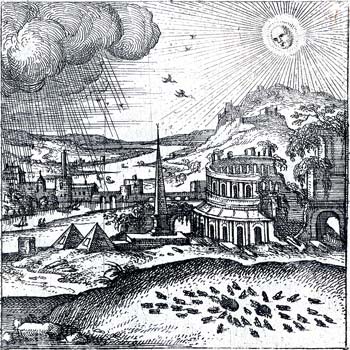The second property of the ant is that when it stores grain in its dwelling, it divides the grain into two parts so that it will not rot in the winter or germinate if flooded, and the ants will not die of hunger. The Epiphanius version adds that the ant is an intelligent animal that can predict the coming of winter, and so works when the sun is hot to gather its harvest while the weather is calm. The interpretation of dividing the grain is that Christians are to divide the Old Testament teaching into two parts: the letter of the law and the spirit of the law. Quoting Paul the Apostle ("The letter kills, but the spirit gives life" [II Corinthians 3:6]) the interpretation says that Christians must obey the spirit of the law, and not be like the Jews who followed the letter of the law and died of (spiritual) hunger.
The ants in the van der Borcht copperplate engraving below are gathered around two large seeds in the center; two ants appear to be tearing each seed in half. The rains of winter are sweeping in from the left. This could also be a reference to another attribute of the ant mentioned by Pliny the Elder: if the grain the ants have stored becomes wet, they bring it out on a sunny day to dry; in this case the rain would be moving away, having already done its damage.
It is less clear what the ants in the woodcut below (from the Rome, 1577 edition) are doing, but they appear to be gathered around two large seeds. They may be splitting the seeds, or be drying their grain.


